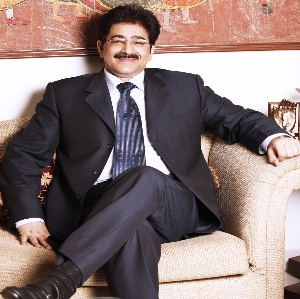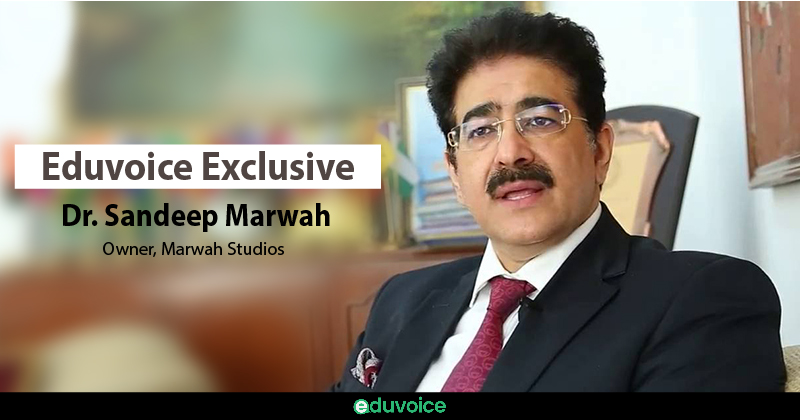Eduvoice exclusive interview

Dr. Sandeep Marwah
Founder of Noida Film City and Marwah Studios
Founder of Asian Academy of Film and Television now one of the ten best film schools in the World
Has 7 World Records to his credit
introduction
Dr. Sandeep Marwah sheds light on the current problems and scope associated with education in media institutes of India. In this interview, he talks about the shift in perception that people have about one pursuing media studies as a mainstream career option. He also emphasized on the need for creating a more vibrant education system to facilitate better learning among students.

Sujata Mehta
What is the current situation for pursuing Media studies as a career choice in India?

Dr. Sandeep Marwah
At present, the Media and Entertainment industry is the 6th largest industry in our country. It has a turnover of approximately 300 thousand crores per year and around 6 million people are working in this industry in India.
If we talk about India’s presence in different fields of mass communication, we have the biggest film industry in the world, with around 2600 movies being produced every year in various languages. It is estimated that approximately 1.5 crore people watch cinema every day in India, which is helping our industry to yield the largest turnover in the world.
India has around 950 television channels in more than 28 languages and 40000 newspapers (registered/non-registered) with the Ministry of Information and Broadcasting, at present; the largest selling English and Hindi newspapers being published in India.
As far as the radio industry is concerned, we have 350 radio stations in our country. Also, India is achieving new heights in today’s age of digital era. We have around 1 billion telephone connections in our country, which accounts for the 2nd largest number of mobile phone usage in the world after China.
So, you can now imagine with that kind of media industry in our country, we have a huge scope for education, training of industry workers.
SUBSCRIBE TO OUR NEWSLETTER
Get latest updates about our Exclusive Interviews, News, Articles on Higher Education Sector.

Sujata Mehta
Despite having one of the largest media and entertainment industries in the world, parents are still reluctant to send their children to opt for media as a mainstream career choice. Comment.

Dr. Sandeep Marwah
I believe that this is not the case anymore. To give an example, 27 years back, when I started this institution and I used to talk to students, families, friends and other people, and they all said that they would prefer enrolling their children enrolled in traditional courses i.e. law, management, MBBS, and engineering.
But I feel things have changed now with the drastic advancements in technology and the media industry. Students are now not reluctant to pursue media studies as their career option and parents are equally supportive of this decision.
Also, I am glad that I played an instrumental role in the development of courses and professions related to film, television, media arts and culture in our country. As an organization, we have more than 700 achievements in total, including 7 world records to our name until now.
“When we started in 1993, there were only 3 other institutes for media studies in our country. Unfortunately, they were going through a bad phase. At that time, people also realized that it is not easy to get in this field before having in-depth knowledge about different fields of mass communication and the use of equipment. To backup the biggest film industry in this world, we needed a good university and I am lucky that I now have this responsibility on my shoulders. We have now started AAFT University of Media and Arts in Raipur as well.”

Sujata Mehta
At present, the main challenge that our Indian education industry is facing i.e. Curriculum, which is not changing as it should be ideally with so many technological advancements going on. So what’s your take on this? Please suggest some solutions for the same

Dr. Sandeep Marwah
In 1993, I realized that film and television education is like medical education. No medical institute is provided with a license until and unless it is affiliated to a recognized hospital.
I believe that the procedure should be the same for providing licenses to media institutes. No film and media education institute should be given license until and unless they are affiliated to film production houses.
I believe this is one of the reasons for the success of our institute since we are affiliated with a film studio. Also, we are in the film city, which provides us with the opportunity to have great industry interaction for our students.
To produce a film, tv shows, radio shows, etc, a person has to think out of the box since there is a lot of competition. To cope up with the competition in today’s age of technological advancements, we need to keep modifying the syllabus within 6 months for media courses.
“I remember when we started, we had a 16mm or 35mm camera, then we switched to a tube camera followed by low band, high band and beta cam. Now we are in the digital era. So, I have seen 8-9 formats during the last 27 years. The technological advancements are so fast that the whole set of equipment changes and becomes obsolete after a few years.”
There are universities and courses where not much heed is paid to make necessary changes to the curriculum. As a result, there is no addition and subtraction in the syllabus and unfortunately, these courses have become obsolete in the international market.
With the advent of the internet, we can now have information on just a click. Students have become smarter now and willing to learn new things.
They expect institutes to teach them such interdisciplinary practical things, which are not mentioned on web platforms like Google. Therefore, institutes have to be cautious in designing courses so that students are being provided on-hand training to gain enough practical exposure.

Sujata Mehta
According to you, where do we stand in media studies on the global scenario?

Dr. Sandeep Marwah

Sujata Mehta
You must have faced a lot of challenges in terms of pioneering media education in India. So you have any particular belief that you want to share with our audience? or any advice for them?

Dr. Sandeep Marwah

Sujata Mehta
What is the current scenario in the higher education system of India and what are your suggestions for the betterment of it in our country?

Dr. Sandeep Marwah

Sujata Mehta
How does one make the students respect the institute and course?






